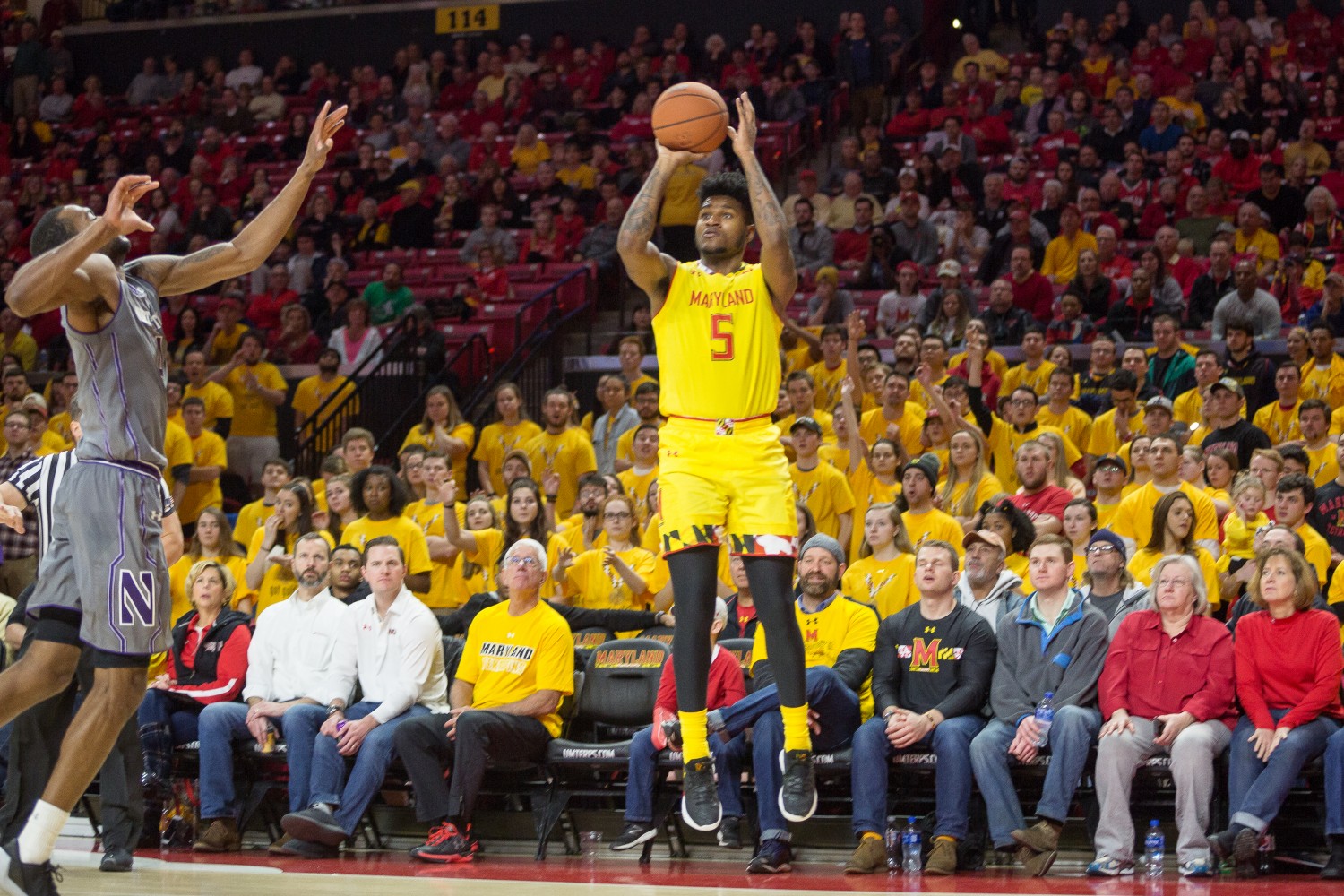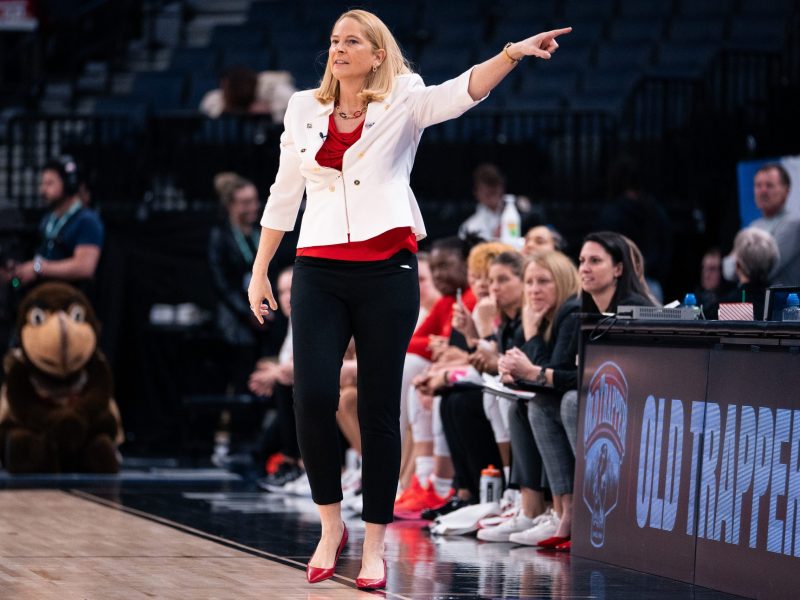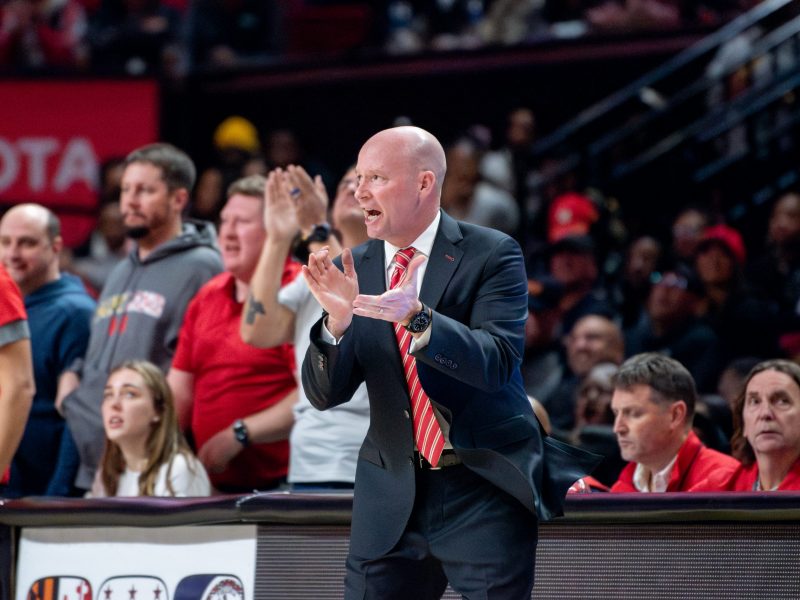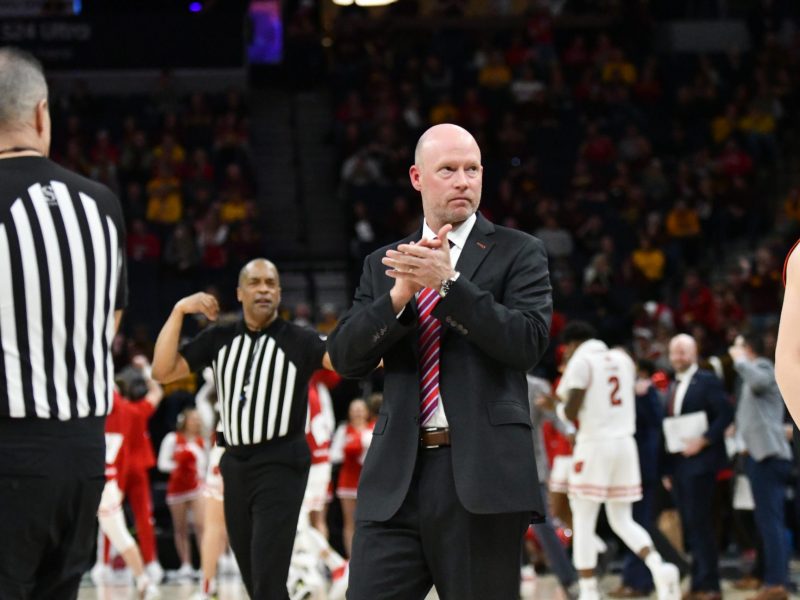By the end of the 2014-15 season, Potomac High School basketball coach Renard Johnson was used to the phone calls.
Colleges were asking if there was any truth to the whispers that Johnson’s former star, Dion Wiley, was transferring from Maryland men’s basketball after his freshman year, when he started just two games and averaged 13.5 minutes per contest.
No matter who was asking, Johnson had the same answer.
“Until you hear from Dion, or he shows up in front of you,” Johnson would say, “he’s not leaving.”
Johnson was right, but Wiley’s middling rookie campaign turned out to be more successful than his next two seasons. The once-heralded recruit’s first three years at Maryland offered him challenges he hadn’t faced before and tanked his confidence.
Still, the 6-foot-4 guard remained in College Park, battling through campaigns mired or erased by injuries.
This season, Wiley has earned starting minutes as a redshirt junior, reaping the benefits of staying the course. With improved health, he’s shown flashes of the star potential those around him believe he still has despite the struggles he’s endured in his first four college years.
Hometown hero
Wiley has “loyalty” tattooed on the inside of his left bicep, and he displayed that faithfulness during his rise as a high school prospect.
After being academically ineligible as a freshman at Potomac, Wiley burst onto the scene as a sophomore and led the Wolverines to the 3A state championship game as a junior. During those summers, Johnson would hear the names of various schools Wiley was supposedly enrolling in for the upcoming year.
Then, the first day of school would come, and Wiley would still be a Wolverine, representing his hometown public school in Oxon Hill.
“He’d walk right through the door and say, ‘Coach, you already know,'” Johnson said. “I’d say, ‘I already know, but there’s about 10 other people who need to know!'”
Above all, Wiley’s devotion to his roots is why he remained at Potomac rather than take the evermore-popular private school route. He also continued playing AAU games with the Maryland Ruff Riders even after joining the more prestigious Team Takeover.
In his senior season in 2014, Wiley powered the Wolverines to their first state title since 2005.
“It was home to me,” Wiley said. “I just felt like that was where my heart was.”
Wiley — whom 247Sports ranked the No. 52 player in the nation and No. 2 player in Maryland in the 2014 class — continued his dedication to his home by committing to Maryland without visiting any other school from his extensive list of high-profile offers.
“Nothing meant more to Dion than playing in his neighborhood school,” said Ricky Goings, who works with D.C.-area basketball players and has become a mentor to Wiley, “and going to Maryland to play in front of those same people.”
In July, Wiley tweeted a video of himself holding the Maryland flag with the caption: “You know I’m reppin the home team.”
“He’s not a change-up guy,” Goings said. “He’s not a guy to act brand new.”
Plans derailed
Wiley’s decision to play with his local teams growing up meant he didn’t always face the highest level of competition.
So, despite his recruiting pedigree, playing with Maryland was a wake-up call.
“Mentally and physically,” Goings said, “he wasn’t properly prepared for what high-major Division I basketball was going to be like.”
Wiley said he didn’t understand the work ethic required to be successful when he initially arrived at Maryland. He was a role player his freshman season and watched classmates Melo Trimble and Jared Nickens thrive.
Then, before the start of the 2015-16 season, Wiley tore his meniscus, forcing him to sit out the year as a medical redshirt.
The bigger disappointment came when Wiley returned the next season. Early in the year, Wiley doubted he’d ever be the same player.
“It affected my confidence a lot when I got back,” Wiley said. “I was a little bit slow. I wasn’t as explosive as I was before I got hurt.”
Once Wiley neared full health, the lack of playing time frustrated him, said Steve Jiggetts, his former AAU coach.
“In his mind, he’s 100 percent,” Jiggetts said, “so he’s wondering, ‘Why am I not playing?'”
Adding to the nightmare season was a lingering back injury that held Wiley to 20 games in his redshirt sophomore year.
Wiley never found a rhythm during that campaign. Two years and one knee surgery removed from his disappointing debut season, Wiley’s starts (zero), minutes (10.3) and points (3.1) dipped.
Jiggetts said that when Wiley was on the court that year, he often looked over his shoulder for when he would be substituted out, leading to tentative play.
After the season, Jiggetts, as he does every year with former players, asked Wiley whether he wanted to stay at Maryland, and Wiley — like he has every year — said yes.
“I was always just told to fight through adversity,” Wiley said, “wherever I was.”
Fresh start(s)
Entering last fall, Wiley had lost the shine he held as a recruit and, along with it, some of his supporters from Oxon Hill.
But he boasted the best work ethic of his Maryland career and a clean bill of health.
“These last two years haven’t been any fun,” Terps coach Mark Turgeon told him before the season. “But you’re going to remember these last two years more than any of them, so let’s make the most of them.”
Wiley seemed to take the message to heart, especially on the defensive end. Wiley admits he didn’t take defense seriously before arriving in College Park.
“Turgeon explained to me that the only way I would play,” Wiley said, “is if I was going to defend.”
Plus, Goings said Wiley discovered playing defense could guarantee him minutes and ease the pressure he felt as a sophomore.
After Wiley endured early-season inconsistencies and missed some time due to illness and injuries, Turgeon has commended Wiley’s defense during conference play, and the seventh-year coach said Wiley contributes more than fans realize.
Wiley sealed Maryland’s win over Wisconsin on Feb. 4 with a block in the final seconds.
After Turgeon chastised Wiley’s lifeless performance against Penn State on Feb. 7, Wiley responded with what Turgeon called his most complete outing of the year. Maryland beat Northwestern, 73-57, and held star Wildcats guards Bryant McIntosh and Scottie Lindsey to a combined 8-for-25 from the field.
“When he’s knocking down shots, locked in defensively,” guard Darryl Morsell said. “That’s when we have our best Dion.”
Promise restored
Wiley’s health has allowed him to experience a resurgent season, but his improved mentality as the season has progressed has been nearly as important. Johnson said by showing belief in Wiley and giving him playing time, Turgeon has helped the redshirt junior reach new heights.
Wiley has earned starts in 16 of his 28 appearances, averaging a career-high 21.7 minutes and 5.8 points per game.
“At times [last year] when I stepped on the floor, I wasn’t really confident,” Wiley said. “If I would try to attack the rim or take a shot, I would feel out of place. Now, my teammates and my coaches encourage me to do stuff like that.”
So, as Turgeon hoped before the season, Wiley has enjoyed his fourth year at Maryland more than any of the ones that preceded it.
Johnson said on a scale of 1-10, Wiley’s confidence is at a 7 or 8 this season, after being as low as 1 last year. Jiggetts said his weekly check-ins have had a more positive tone.
Wiley has served as Maryland’s X-factor, since the team’s results often depend on his output.
But despite his improvement, Wiley and his coaches agree he has yet to play to his potential.
This season, though, for the first time since he won a state title for Potomac on the Comcast Center floor, Wiley offered hope he can reach the goal he’s been chasing for four years: shine for his local college the same way he did for his hometown high school.
“The ending of his story at Maryland,” Goings said, “is going to surprise some people.”



